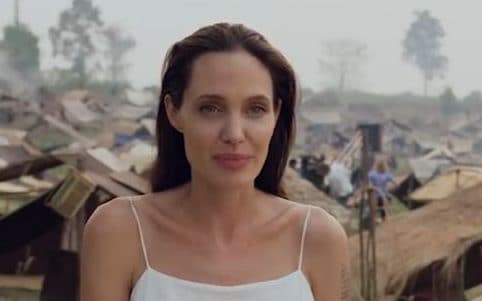Angelina Jolie's casting game with Cambodian orphans sparks outrage

Angelina Jolie has come under fierce criticism for describing the casting of Cambodian children in her new film, in which the team gave the impoverished youngsters money and then pretended to take it away from them, awarding roles to the children who looked the most upset.
Jolie, a noted humanitarian and UN Goodwill Ambassador, whose efforts in Iraq, Bosnia, Haiti and Rwanda led to her working in cooperation with former foreign secretary William Hague, was speaking about the process of making her latest film, First They Killed My Father.
The tale is a true-life story of Loung Ung and the horrors of Pol Pot’s regime.
Jolie told Vanity Fair about the process of casting the children in the film, travelling to orphanages, circuses and slum schools “seeking children who had experienced hardship”.
The journalist writes: “In order to find their lead, to play young Loung Ung, the casting directors set up a game, rather disturbing in its realism: they put money on the table and asked the child to think of something she needed the money for, and then to snatch it away. The director would pretend to catch the child, and the child would have to come up with a lie.”
Jolie continues: “Srey Moch [the girl ultimately chosen for the part] was the only child that stared at the money for a very, very long time.
“When she was forced to give it back, she became overwhelmed with emotion. All these different things came flooding back.
“When she was asked later what the money was for, she said her grandfather had died, and they didn’t have enough money for a nice funeral.”
The article notes that what it describes as an “authentic connection to pain” provided a powerful atmosphere on set.
“There wasn’t a person who was working on the movie who didn’t have a personal connection,” Jolie said.
“They weren’t coming to do a job. They were walking in the exodus for the people whom they had lost in their family, and it was out of respect for them that they were going to re-create it.
“It completed something for them.”
She told the journalist that some members of the cast and crew had flashbacks and nightmares, and so a therapist was on set every day.
She also mentioned how even bystanders were traumatised.
“When the Khmer Rouge came over the bridge, we had a few people who really dropped to their knees and wailed. They were horrified to see them come back,” she said.
The revelations about her casting methods were met with outrage on social media.
If Angelina Jolie wanted to cast destitute children adept at lying to foreigners, she should have gone with the Pub Street milk-scam girls
— Lina Goldberg (@MovetoCambodia) July 27, 2017
I've previously held the minority opinion that Jolie is quite good, smart and careful re Cambodia, but...well...this whole article is a mess
— Harriet Fitch Little (@HarrietFL) July 27, 2017
angelina jolie cast her latest movie by taunting poor children with cash https://t.co/vXRxnorU4R
— Jessica Roy (@JessicaKRoy) July 26, 2017
Why in the HELL were Angelina Jolie and Co traumatizing poor cambodian children for "casting"? How is this applause worthy? https://t.co/79XYK1eRXK
— Shanelle Little (@ShanelleLittle) July 26, 2017
Angelina Jolie: from Hollywood wildchild to UN ambassador
Jessica Roy, news editor for New York magazine’s The Cut section, noted: “Angelina Jolie cast her latest movie by taunting poor children with cash.”
Another woman added: “Why in the hell were Angelina Jolie and co traumatising poor Cambodian children for "casting"? How is this applause worthy?”
Jolie used the rest of the interview to explain how she began the project only after consulting widely with Cambodians, and approaching the culture ministry.
The 42-year-old, who has Cambodian citizenship after filming Tomb Raider in the country and falling in love with it, won over the Cambodian authorities.
They allowed her to shut down the town of Battambang for days, gave the filmmakers permits to land in remote zones, and provided them with 500 officials from their actual army to play the Khmer Rouge army.
Around 3,500 Cambodians participated as cast and crew, and the world premiere was held in Siem Reap, amid the ruins of Angkor Wat.
“It’s not a poetic thing to say—[this film] was made by the country,” she said.
Jolie’s representatives did not respond to The Telegraph’s request for comment.
